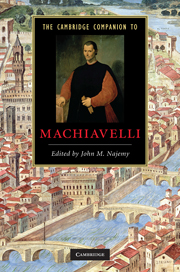Book contents
- Frontmatter
- Introduction
- 1 Niccolò Machiavelli: a portrait
- 2 Machiavelli in the chancery
- 3 Machiavelli, Piero Soderini, and the republic of 1494-1512
- 4 Machiavelli and the Medici
- 5 Machiavelli’s Prince in the epic tradition
- 6 Society, class, and state in Machiavelli’s Discourses on Livy
- 7 Machiavelli’s military project and the Art of War
- 8 Machiavelli’s Florentine Histories
- 9 Machiavelli and Rome: the republic as ideal and as history
- 10 Philosophy and religion in Machiavelli
- 11 Rhetoric and ethics in Machiavelli
- 12 Machiavelli and poetry
- 13 Comedian, tragedian: Machiavelli and traditions of Renaissance theater
- 14 Machiavelli and gender
- 15 Machiavelli’s afterlife and reputation to the eighteenth century
- 16 Machiavelli in political thought from the age of revolutions to the present
- Index
3 - Machiavelli, Piero Soderini, and the republic of 1494-1512
Published online by Cambridge University Press: 28 September 2010
- Frontmatter
- Introduction
- 1 Niccolò Machiavelli: a portrait
- 2 Machiavelli in the chancery
- 3 Machiavelli, Piero Soderini, and the republic of 1494-1512
- 4 Machiavelli and the Medici
- 5 Machiavelli’s Prince in the epic tradition
- 6 Society, class, and state in Machiavelli’s Discourses on Livy
- 7 Machiavelli’s military project and the Art of War
- 8 Machiavelli’s Florentine Histories
- 9 Machiavelli and Rome: the republic as ideal and as history
- 10 Philosophy and religion in Machiavelli
- 11 Rhetoric and ethics in Machiavelli
- 12 Machiavelli and poetry
- 13 Comedian, tragedian: Machiavelli and traditions of Renaissance theater
- 14 Machiavelli and gender
- 15 Machiavelli’s afterlife and reputation to the eighteenth century
- 16 Machiavelli in political thought from the age of revolutions to the present
- Index
Summary
In the dedications to both The Prince and the Discourses, Machiavelli asserted that he had acquired his understanding of politics through lengthy experience of the contemporary world and continual reading of ancient texts. His fourteen-year career in the Florentine chancery placed him at the hub of government and politics and afforded him manifold opportunities, whether at his desk in Florence or as an emissary abroad, to observe and experience at close hand the problems of Florentine politics and territorial administration and European diplomacy and statecraft, problems on which he meditated and began to write during his career in government. Machiavelli's participation in the political world came to an abrupt end in 1512, when a successful coup against Piero Soderini, the elected permanent head of Florentine government, caused the collapse of the republic, the restoration of a generally unpopular Medici regime, and Machiavelli's dismissal from his posts and banishment from political action. The coup and his fate gave Machiavelli the time to write more discursively about his understanding of political affairs from a perspective sharpened by the failure of the regime and personal loss. Among the issues that preoccupied Machiavelli in the major works of his enforced retirement were military strength and force, political stability, and leadership, or rather their reverse: the military weakness, instability, inadequate justice, factionalism, and absence of leadership that dogged the Florentine Republic for much of his time in the chancery.
- Type
- Chapter
- Information
- The Cambridge Companion to Machiavelli , pp. 48 - 63Publisher: Cambridge University PressPrint publication year: 2010
- 1
- Cited by

